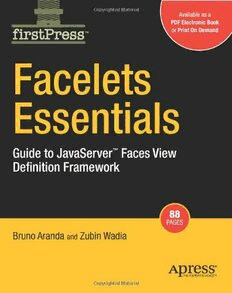Download Facelets Essentials: Guide to JavaServer Faces View Definition Framework PDF Free - Full Version
Download Facelets Essentials: Guide to JavaServer Faces View Definition Framework by Bruno Aranda, Zubin Wadia in PDF format completely FREE. No registration required, no payment needed. Get instant access to this valuable resource on PDFdrive.to!
About Facelets Essentials: Guide to JavaServer Faces View Definition Framework
Facelets is a templating language developed from the ground up with JavaServer Faces in mind. Created in response to the many concerns involving JSP when building JavaServer Faces views, Facelets steps outside of the JSP specification and provides a highly performant, JSF–centric view technology. Facelets top properties, templating, reuse, and ease of development, allows it to help making JSF a technology suitable for large–scale projects. One of the first things a developer using Facelets finds is that it immediately leads to a reduction in UI code. Facelets Essentials, the first book on Facelets, introduces you to its importance, architecture, and relationship to JSF and the Apache MyFaces web framework. Learn to create your first application using the power and flexibility Facelets offers. Then, master and apply its basic and advanced features including Unified Expression Language, templating and reuse, custom tag development, and more. What you’ll learn See why you should use Facelets and the Facelets architecture. Ccreate your first application with Facelets. Use the Facelets Unified Expression Language. Explore Facelets templating and reuse, as well as the tag reference and custom tag development. Create composition components. Extend the ViewHandler. And more Who is this book for? This book is for Java web developers who are using or experienced with JSF and perhaps learning to use the MyFaces web framework.
Detailed Information
| Author: | Bruno Aranda, Zubin Wadia |
|---|---|
| Publication Year: | 2008 |
| ISBN: | 9781430210504 |
| Pages: | 90 |
| Language: | English |
| File Size: | 0.979 |
| Format: | |
| Price: | FREE |
Safe & Secure Download - No registration required
Why Choose PDFdrive for Your Free Facelets Essentials: Guide to JavaServer Faces View Definition Framework Download?
- 100% Free: No hidden fees or subscriptions required for one book every day.
- No Registration: Immediate access is available without creating accounts for one book every day.
- Safe and Secure: Clean downloads without malware or viruses
- Multiple Formats: PDF, MOBI, Mpub,... optimized for all devices
- Educational Resource: Supporting knowledge sharing and learning
Frequently Asked Questions
Is it really free to download Facelets Essentials: Guide to JavaServer Faces View Definition Framework PDF?
Yes, on https://PDFdrive.to you can download Facelets Essentials: Guide to JavaServer Faces View Definition Framework by Bruno Aranda, Zubin Wadia completely free. We don't require any payment, subscription, or registration to access this PDF file. For 3 books every day.
How can I read Facelets Essentials: Guide to JavaServer Faces View Definition Framework on my mobile device?
After downloading Facelets Essentials: Guide to JavaServer Faces View Definition Framework PDF, you can open it with any PDF reader app on your phone or tablet. We recommend using Adobe Acrobat Reader, Apple Books, or Google Play Books for the best reading experience.
Is this the full version of Facelets Essentials: Guide to JavaServer Faces View Definition Framework?
Yes, this is the complete PDF version of Facelets Essentials: Guide to JavaServer Faces View Definition Framework by Bruno Aranda, Zubin Wadia. You will be able to read the entire content as in the printed version without missing any pages.
Is it legal to download Facelets Essentials: Guide to JavaServer Faces View Definition Framework PDF for free?
https://PDFdrive.to provides links to free educational resources available online. We do not store any files on our servers. Please be aware of copyright laws in your country before downloading.
The materials shared are intended for research, educational, and personal use in accordance with fair use principles.

